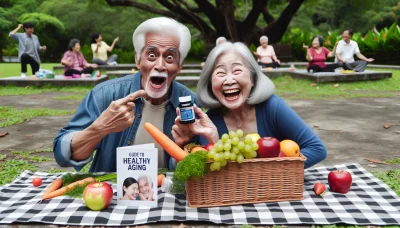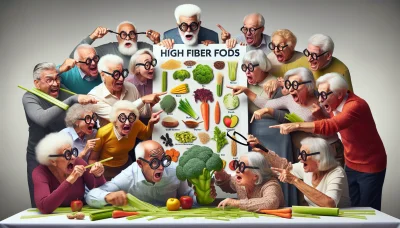Best supplements for anti aging Quiz
Test Your Knowledge
Question of
Understanding Anti-Aging Supplements
Defining Anti-Aging and Its Biological Basis
Anti-aging is a term that encapsulates the strategies, treatments, and lifestyle choices aimed at slowing down or reversing the biological processes of aging. The goal is to extend both lifespan and healthspan, ensuring years are not just added to life, but life is added to those years. It's a multidimensional approach that targets various aspects of cellular and molecular function.
At the biological level, anti-aging focuses on maintaining cellular integrity and optimizing bodily functions as we age. This involves understanding and mitigating the natural decline in physiological systems and the body's ability to repair damage. The science behind anti-aging is constantly evolving, uncovering new insights into how we age and how we might intervene.
The Role of Telomeres in Aging
Telomeres are protective caps at the ends of chromosomes that play a crucial role in cellular aging. Each time a cell divides, telomeres become shorter until they reach a critical length leading to cell senescence or death. Research suggests that preserving telomere length may be key to delaying aging processes.
Various lifestyle factors such as diet, exercise, and stress management can influence telomere length. Additionally, some anti-aging supplements claim to support telomere maintenance, although their effectiveness is an area of ongoing research.
Oxidative Stress and Cellular Damage
Oxidative stress occurs when there's an imbalance between free radicals and antioxidants in the body. This imbalance leads to cellular damage which contributes to aging and various diseases. Understanding this mechanism has been pivotal in developing anti-aging strategies.
Anti-aging interventions often aim to reduce oxidative stress by enhancing the body's antioxidant defenses. Supplements designed for this purpose contain compounds known for their antioxidant properties, potentially helping to mitigate the effects of oxidative damage over time.
Key Ingredients in Anti-Aging Supplements
Antioxidants: Types and Benefits
Antioxidants are substances that can prevent or slow damage caused by free radicals. Common antioxidants found in supplements include vitamins C and E, beta-carotene, and selenium. These compounds help neutralize free radicals, reducing oxidative stress and potentially slowing aging at the cellular level.
- *Vitamin C: Essential for collagen production; supports skin health. *Vitamin E: Powerful lipid-soluble antioxidant; protects cell membranes. *Beta-Carotene: Precursor of vitamin A; supports immune function and vision. *Selenium: Trace mineral with antioxidant properties; supports thyroid function.
Amino Acids and Their Effect on Longevity
Amino acids are the building blocks of proteins and play a vital role in maintaining healthy bodily functions. Certain amino acids like L-carnitine are associated with improved mitochondrial function and energy metabolism which could have anti-aging effects.
Others like glutathione are directly involved in reducing oxidative stress. Supplementing with specific amino acids may support these processes, although its important to understand the balance required for optimal health benefits.
Evaluating the Efficacy of Supplements
Clinical Studies and Research Findings
The true measure of any anti-aging supplement lies in its scientifically proven efficacy. Clinical studies provide insights into how these supplements interact with biological pathways related to aging. Such research often involves controlled trials that assess changes in biomarkers of aging after supplementation.
While some ingredients have shown promise under scientific scrutiny, others lack substantial evidence supporting their claims. It is essential for consumers to critically evaluate research findings before integrating supplements into their anti-aging regimen.
User Testimonials and Experiences
Beyond clinical evidence, user testimonials can offer personal accounts of supplement effectiveness. These anecdotes provide real-world insights into potential benefits or drawbacks not always captured in scientific studies.
However, its important to approach testimonials with caution as they can be subjective and influenced by numerous factors outside of the supplement itself. Cross-referencing user experiences with clinical data remains a prudent strategy when considering anti-aging supplements.
Top Anti-Aging Vitamins and Minerals
Essential Vitamins for Healthy Aging
The quest for longevity is as old as time, and it starts with what you put on your plate! Essential vitamins are the secret weapons in the battle against aging. They protect our cells from oxidative stress and help repair damage. Without a doubt, including the right vitamins in your diet is a game-changer for maintaining youthful vigor.
Don't just ageage like fine wine! It's not just about adding years to life but life to years. Vitamins like A, B12, E, and K play critical roles in preserving your health. They support cognitive function, energy levels, and heart health. It's never too late to revitalize your body with these powerhouse nutrients!
Vitamin D and Bone Health
Let's shine some light on Vitamin D, the "sunshine vitamin"! It's a cornerstone for strong bones and a robust immune system. As we age, our bodies need more Vitamin D to combat the risk of bone diseases like osteoporosis. It's not just about basking in the sun; this vitamin is a beacon of strength.
Are you getting enough Vitamin D? Many adults are deficient without even knowing it! This deficiency can lead to significant health issues beyond weak bones. From muscle weakness to increased infection risk, low Vitamin D levels can take a toll on your health. Time to turn up the dial on this essential nutrient!
Vitamin C and Skin Elasticity
Vitamin C is not just for fighting coldsit's a fountain of youth for your skin! This vital nutrient is pivotal in producing collagen, which keeps skin firm and wrinkle-free. Say goodbye to saggy skin and hello to a radiant complexion with this citrusy superhero.
Think of Vitamin C as your personal bodyguard against skin aging. It wards off free radicals that can lead to premature aging signs. And let's not forget its role in healing wounds and reducing scars. It's not magic; it's science working to keep you looking young!
Minerals That Combat Aging
Selenium's Antioxidant Properties
Selenium steps onto the scene with its incredible antioxidant properties! This mineral is like an elite soldier guarding your cells against the onslaught of free radicals. Its protective prowess helps maintain youthful energy levels and reduces the risk of chronic diseases.
A selenium-rich diet could be your secret weapon against aging. With its ability to boost heart health and immunity, selenium plays a crucial role in keeping you vibrant as you age. It also aids in thyroid function, ensuring that your metabolism stays fired up!
Zinc for Immune Function and Repair
Zincthe unsung hero of immune defense! This powerful mineral does more than bolster immunity; it accelerates wound healing and supports healthy cell division. When it comes to anti-aging, zinc ensures that your bodys repair mechanisms are always on point.
Don't underestimate the power of zinc in maintaining your youthful essence! Its impact on skin health is remarkablefighting acne, reducing inflammation, and promoting clear skin. Zinc is truly an all-in-one mineral that keeps your defenses high and aging low.
How to Incorporate Vitamins and Minerals into Your Diet
Food Sources Rich in Anti-Aging Nutrients
Herbal Supplements for Longevity
Popular Herbs with Anti-Aging Properties
The quest for longevity has led many to explore the benefits of herbal supplements known for their anti-aging properties. These natural remedies are cherished for their potential to enhance overall well-being and delay the signs of aging.
Among these, antioxidants play a crucial role in combatting oxidative stress, a significant contributor to the aging process. Herbs rich in antioxidants are sought after for their ability to protect cells from damage.
Ginkgo Biloba and Cognitive Function
Ginkgo Biloba stands out as a top-tier supplement, celebrated for its positive impact on cognitive function. Its flavonoids and terpenoids contribute to improved blood flow to the brain, which is essential for maintaining mental acuity.
Regular intake of Ginkgo has been associated with enhanced memory and focus, making it a popular choice among those looking to preserve cognitive health as they age.
Turmeric and Its Anti-Inflammatory Effects
Turmeric, with its active component curcumin, is renowned for its potent anti-inflammatory effects. Chronic inflammation is a known accelerant of the aging process; thus, turmeric is a valuable ally in the fight against time.
Its efficacy extends beyond just anti-aging; turmeric also supports joint health and cardiovascular function, making it a comprehensive choice for health maintenance.
Adaptogens: Stress Reduction and Vitality
Adaptogens are a unique class of herbs that support the body's ability to handle stress. They are believed to stabilize physiological processes and promote homeostasis, which may contribute to increased vitality and longevity.
Their role in enhancing resilience against physical and emotional stressors makes them an integral part of many longevity-focused regimens.
Ashwagandha and Hormonal Balance
Ashwagandha is an adaptogen revered for its ability to regulate hormonal balance. It's especially known for modulating cortisol levels, which can mitigate stress-related aging effects on the body.
This herb's capacity to support adrenal function makes it a cornerstone supplement for those seeking to maintain youthful vigor and hormonal harmony.
Rhodiola Rosea for Energy and Stamina
Rhodiola Rosea is another adaptogenic powerhouse that enhances energy and stamina. By bolstering the body's natural energy production mechanisms, Rhodiola can help individuals feel more vibrant and capable of tackling daily challenges.
Its usage is particularly beneficial for those who lead active lifestyles or require sustained mental focus throughout their endeavors.
Safety Considerations When Using Herbal Supplements
While herbal supplements offer numerous benefits, it's crucial to consider safety aspects before incorporating them into your routine. Understanding potential risks ensures responsible usage and maximizes benefits.
- Consult Healthcare Providers: Always speak with a healthcare professional before starting any new supplement regimen, especially if you have pre-existing conditions or are pregnant/nursing.
- Quality Matters: Opt for high-quality products from reputable manufacturers to ensure purity and potency of the herbal supplements.
- Beware of Allergic Reactions: Be aware of any personal allergies or sensitivities to specific herbs or plant families when selecting supplements.
- Moderation is Key: Even natural substances can be harmful in excessive amounts; adhere strictly to recommended dosages unless advised otherwise by a professional.
- Potential Interactions: Investigate possible interactions between herbal supplements and any medications or other supplements you may be taking.
- Monitor Your Response: Pay attention to your body's reactions when starting new supplements; discontinue use immediately if adverse effects occur.
- Dosage Considerations: Appropriate dosages may vary based on individual factors such as age, weight, and health status; adjust accordingly under professional guidance.
Anti-Aging Benefits of Omega-3 Fatty Acids
Understanding Omega-3s and Their Role in Aging
Omega-3 fatty acids are essential fats that the body cannot produce on its own, playing a critical role in cellular health and aging. They contribute to the fluidity of cell membranes, allowing for better nutrient absorption and waste removal. With potent anti-inflammatory properties, omega-3s combat chronic inflammation, a common culprit behind accelerated aging and age-related diseases.
EPA (eicosapentaenoic acid) and DHA (docosahexaenoic acid) are particularly influential omega-3s found in fish oil. They are involved in the repair and regeneration of cells, potentially slowing down the biological aging process. Their molecular impact includes supporting brain health, reducing oxidative stress, and improving heart function all vital for maintaining youthfulness at a cellular level.
EPA and DHA: Molecular Impact on Aging Cells
EPA and DHA have been shown to influence gene expression related to aging. They can activate pathways that promote longevity while turning off those associated with inflammation and cell death. This balance is crucial for preserving telomere length, structures at the end of chromosomes that shorten with age, leading to cellular senescence.
The Importance of a Balanced Omega Ratio
A balanced ratio of omega-6 to omega-3 fatty acids is crucial for optimal health. The modern diet often skews heavily towards omega-6s, which can promote inflammation when not balanced with sufficient omega-3 intake. Striving for a lower ratio by increasing omega-3 consumption can help mitigate inflammation and support healthy aging.
Sources of Omega-3s: Fish Oil vs. Plant-Based Alternatives
Fish oil is renowned for being rich in EPA and DHA, offering direct sources of these powerful anti-aging agents. However, concerns about contaminants such as mercury or PCBs have led many to seek purified or pharmaceutical-grade supplements that undergo rigorous testing to ensure safety and potency.
For those following a plant-based lifestyle or with concerns about fish-derived products, flaxseed and chia seeds emerge as excellent vegan sources of ALA (alpha-linolenic acid), another type of omega-3. While ALA can be converted into EPA and DHA in the body, this process is relatively inefficient; hence it's crucial for vegans to consider ALA-rich foods or explore algae-based supplements as an alternative.
- Choose high-quality supplements: Look for third-party tested fish oil supplements that certify purity from heavy metals and other contaminants.
- Vary your sources: Incorporate different types of omega-3-rich foods into your diet like salmon, walnuts, flaxseeds, and fortified products.
- Be wary of cooking methods: Opt for low-temperature cooking like steaming or baking to preserve the integrity of omega-3 fatty acids in your food.
- Monitor your ratio: Aim to balance your intake of omega-6s by choosing healthier fats like olive oil over refined vegetable oils.
- Consult with professionals: Work with healthcare providers to determine the right dosage based on individual health needs.
Integrating Omega-3s into Your Diet for Optimal Health
To truly harness the anti-aging power of omega-3s, strategic meal planning is essential. Incorporating fatty fish such as salmon or mackerel twice a week can significantly boost EPA and DHA levels. For vegetarians or those who prefer plant-based diets, flaxseeds or chia seeds can be added to smoothies or salads to increase ALA intake.
Overcoming common dietary deficiencies involves more than just adding omega-3s; it requires an overall diet assessment. Reducing processed foods rich in unhealthy fats while increasing whole food sources rich in omega-3s helps create a balanced nutritional profile that supports both longevity and vitality.
Probiotics, Gut Health, and Aging
The Connection Between the Gut Microbiome and Aging
The gut microbiome is a bustling metropolis of microorganisms that play a pivotal role in our overall health. As we age, the diversity of this microbial community tends to decline, which can have profound impacts on our wellbeing. A rich and balanced gut flora is linked to better digestion, immunity, and even cognitive function.
Research suggests that maintaining a healthy gut microbiome may slow down aspects of the aging process. It's not just about adding years to life, but life to years! By supporting our gut health through diet and lifestyle choices, we may enhance our vitality and resilience as we advance in age.
Gut Dysbiosis and Its Impact on Healthspan
Gut dysbiosis occurs when there's an imbalance in the microbial ecosystem within our intestines. This disharmony can lead to a cascade of health issues including inflammation, metabolic disorders, and even neurological conditions. It's like a garden overgrown with weeds; without balance, the whole system suffers.
Keeping our gut flora in harmony is crucial for extending our healthspanthe period of life spent in good health. An equilibrium within our gut microbiota fosters a strong immune system and reduces the risk of chronic diseases often associated with aging.
Probiotic Strains That Support Healthy Aging
Not all probiotics are created equal, especially when it comes to supporting healthy aging. Certain strains like Lactobacillus and Bifidobacterium have been shown to be particularly beneficial. They're like the superheroes of the microbial world, defending against pathogens and supporting metabolic processes.
- Lactobacillus acidophilus: Helps maintain intestinal integrity and supports immune function.
- Bifidobacterium longum: Known for its anti-inflammatory properties and ability to reduce harmful bacteria.
- Lactobacillus plantarum: Aids in breaking down food for better nutrient absorption.
- Lactobacillus paracasei: Can improve digestive comfort and support the body's natural defenses.
Choosing the Right Probiotic Supplement
Finding the right probiotic supplement is like choosing a personal wellness coach for your gut. Its important to look at CFUscolony forming unitswhich indicate how many live microorganisms each dose contains. Generally speaking, higher CFU counts can mean more potential benefits for your gut flora.
The stability of probiotic formulas is also critical; these living organisms need proper care. Look for supplements with protective packaging or those requiring refrigeration to ensure you're getting live probiotics ready to spring into action once ingested.
Dietary Sources of Probiotics and Prebiotics
Fermented Foods for a Healthy Gut Flora
Fermented foods are natures probiotic powerhouses! Yogurt, kefir, kimchi, sauerkraut theyre all teeming with beneficial bacteria that can help populate your gut with health-boosting microbes. Incorporating these tangy treasures into your diet can support digestive health and enhance nutrient absorption.
Prebiotic Fibers to Nourish Beneficial Bacteria
Prebiotics are the fuel that feeds your friendly gut bacteria. Found in foods like bananas, onions, garlic, and chicory root, prebiotic fibers help nourish your existing microbiota. It's like throwing a feast for your beneficial bugs they thrive on these fibrous foods!
Anti-Aging Diets: What Works Best?
The Science Behind Caloric Restriction and Longevity
Studies have consistently shown that caloric restriction can lead to increased lifespan in various organisms. The science is clear: fewer calories can trigger a complex chain of biological mechanisms that promote longevity. This tantalizing evidence has spurred a wave of interest in how caloric restriction may translate to human aging.
However, it's not just about eating less; the quality of your diet remains paramount. Researchers are exploring how reducing calorie intake, while still obtaining necessary nutrients, might be a key strategy for extending healthy years.
Mechanisms of Caloric Restriction in Aging
Caloric restriction activates a fascinating array of biological pathways that are believed to contribute to longevity. These include improved metabolic efficiency, enhanced DNA repair, reduced oxidative stress, and optimized protein function. Together, these effects can help stave off age-related diseases and promote a longer healthspan.
Interestingly, caloric restriction may also influence longevity genes known as sirtuins. These genes regulate cellular health and can protect against the deterioration associated with aging.
Practical Tips for Reducing Caloric Intake Safely
- Mindful Eating: Pay attention to hunger cues and stop eating when you're comfortably full.
- Portion Control: Use smaller plates or bowls to naturally reduce portion sizes without feeling deprived.
- Nutrient-Dense Foods: Focus on foods high in nutrients but low in calories, such as fruits, vegetables, lean proteins, and whole grains.
- Avoid Empty Calories: Cut down on sugary drinks and snacks that provide calories but little nutritional value.
- Eat Slowly: It takes time for your brain to register fullness from your stomach; eating slowly can help prevent overeating.
- Hydration: Drink plenty of water throughout the day, which can help control hunger and prevent overeating.
The Mediterranean Diet: A Model for Healthy Aging
The Mediterranean diet is celebrated for its association with longevity and reduced risk of chronic diseases. Characterized by an abundance of plant-based foods, healthy fats, and lean proteins, this diet encapsulates a dietary pattern conducive to good health as we age.
Beyond its nutrient profile, the Mediterranean diet encourages a lifestyle approach that includes regular physical activity and sharing meals with othersfactors that inherently support well-being.
Key Components of the Mediterranean Diet
Fruits, vegetables, whole grains, nuts, seeds, and olive oil form the cornerstone of the Mediterranean diet. Fish and poultry are preferred over red meat, while dairy is consumed in moderation. This balance ensures a wide spectrum of vitamins, minerals, antioxidants, and heart-healthy fats.
An emphasis on fresh and minimally processed foods not only enhances flavor but also maximizes nutrient intakecrucial for combating signs of aging from within.
Olive Oil, Polyphenols, and Heart Health
Olive oil is a superstar in the Mediterranean diet due to its high content of monounsaturated fats and polyphenols. These compounds have been linked to reduced inflammation and improved cardiovascular healthkey factors in preventing age-related decline.
Polyphenols in olive oil also exhibit antioxidant properties that protect cells from damage. Incorporating olive oil into daily meals can therefore be a delicious way to support heart health and longevity.
Intermittent Fasting and Hormesis in Anti-Aging
Intermittent fasting (IF) has emerged as another promising dietary strategy for promoting longevity. By cycling between periods of eating and fasting, IF may initiate cellular repair processes that contribute to anti-aging effects. The idea is not just about restriction but timingallowing the body periods to rest from digestion.
This practice aligns with ancient dietary patterns where food was not always readily availablea stark contrast to today's constant access to food which often leads to overconsumption and metabolic issues.
Different Approaches to Intermittent Fasting
Variations of IF include the 16/8 method (fasting for 16 hours with an 8-hour eating window), the 5:2 approach (eating normally five days a week while restricting calories on two non-consecutive days), among others. This flexibility allows individuals to find an approach that fits their lifestyle while still reaping potential health benefits.
Selecting an IF method should take into account personal habits, medical history, and goalsworking with healthcare professionals can ensure safety and effectiveness.
The Concept of Hormesis and Stress Resistance
Hormesis refers to the adaptive response organisms have to mild stressorsin this case fastingthat results in increased resistance to more significant stressors such as disease or aging. Essentially it's about triggering our bodies' survival mechanisms through controlled exposure to stress like calorie restriction or fasting cycles.
This concept supports theories behind both caloric restriction and intermittent fasting as practices that may induce beneficial stress responses at the cellular levelpotentially leading to improved lifespan and robust late-life health.
Nutritional Synergy for Enhanced Anti-Aging Effects
Combining Supplements for Maximum Benefit
Unlock the secret to a more youthful you by embracing the power of nutritional synergy! Combining specific supplements can catapult your anti-aging efforts to new heights. It's not just about taking various vitamins and minerals; it's about creating a potent mix that works together, boosting each other's efficacy. Imagine an elite team, where each member brings a unique strength, working towards the common goal of keeping you looking and feeling fantastic!
The magic happens when vitamins and minerals join forces. For instance, vitamin D and calcium are like best friends for your bones; they're more effective together than alone. Iron pairs perfectly with vitamin C, enhancing absorption like a charm. This isn't just good advice; it's a game-changer for anyone serious about their health and longevity.
Synergistic Effects of Vitamins and Minerals
When it comes to vitamins and minerals, think of them as a dynamic duo that delivers results. Vitamin E and selenium are the Batman and Robin of antioxidants, protecting your cells from damage with incredible finesse. Magnesium doesn't just stand out on its own; when teamed up with vitamin B6, it becomes a powerhouse for energy metabolism and mood regulation.
Pairing antioxidants is like assembling a superhero squad for your body. Vitamin A, C, and E are the ultimate trio when it comes to safeguarding your health against oxidative stress. They're like a shield that keeps harmful invaders at bay, ensuring your cells stay vibrant and resilient against the test of time.
The Role of Amino Acids and Proteins in Muscle Preservation
Muscle mass isn't just about strength; it's crucial for longevity too. Branched-Chain Amino Acids (BCAAs) are your muscles' best allies in fighting sarcopenia, the age-related loss of muscle. Supplementing with BCAAs supports muscle protein synthesis, keeping those gains strong as you age. It's like giving your muscles an elixir of youthone that keeps them robust and full of vitality!
Collagen peptides aren't just a trend; they're a cornerstone for maintaining youthful skin and supple joints. As you age, natural collagen production declines, but supplementing with collagen peptides can help bridge that gap. It's like laying down new bricks in an aging structure, reinforcing the foundation of your body's largest organyour skin.
Balancing Macronutrients for Longevity
Healthy fats are not foes but friends in the quest for longevity! Omega-3 fatty acids from fish oil are champions at supporting brain health and reducing inflammation. Think of them as lubricants that keep the gears of your body running smoothlya necessity for anyone looking to age gracefully.
Carbohydrates often get a bad rap, but quality is key! Instead of shunning carbs altogether, choose complex ones like those found in whole grains and vegetables. They're not just fuel; they're slow-burning logs that provide sustained energy without spiking your blood sugar levels.
- Optimize Vitamin D & Calcium: Perfect partners for bone health.
- Vitamin C & Iron: Vitamin C boosts iron absorptionessential for vegetarians!
- Vitamin E & Selenium: A dynamic duo protecting cells from oxidative damage.
- Magnesium & Vitamin B6: Team up to enhance mood and energy metabolism.
- Vitamin A, C & E: The antioxidant trio defending against cellular stress.
- BCAAs: Key players in preserving muscle mass as we age.
- Collagen Peptides: The building blocks for youthful skin and healthy joints.
- Omega-3 Fatty Acids: Essential fats that support brain health and reduce inflammation.
- Complex Carbohydrates: Fuel your body with steady energy by choosing smart carbs.
Lifestyle Factors That Complement Anti-Aging Diets and Supplements
Exercise: A Pillar of Anti-Aging Regimens
Integrating exercise into your lifestyle is a game changer when it comes to anti-aging. It boosts metabolism, enhances mood, and improves cognitive function. Regular physical activity is key to maintaining youthful energy levels and resilience against age-related decline.
Moving your body isn't just about looking good; it's about preserving the vitality of your very cells! With consistent exercise, you can expect to see a reduction in the risk of chronic diseases that often come hand-in-hand with aging.
Resistance Training to Combat Muscle Loss with Age
Resistance training is a powerhouse when it comes to anti-aging efforts. It builds muscle, strengthens bones, and stimulates hormonal benefits that keep age at bay. By incorporating weight lifting or bodyweight exercises into your routine, you're setting yourself up for a stronger, more youthful physique.
The beauty of resistance training lies in its ability to reverse sarcopenia the age-related loss of muscle mass. And remember, more muscle means a faster metabolism, so you'll be burning calories even at rest!
Cardiovascular Exercise for Heart Health and Endurance
Cardiovascular exercise isn't just for endurance athletes it's a cornerstone of any anti-aging fitness plan. Activities like running, swimming, or cycling keep the heart strong and blood vessels flexible, reducing the risk of heart disease significantly.
Beyond the heart benefits, cardiovascular exercise has been shown to improve brain health, potentially staving off cognitive decline. So lace up those sneakers; your heart and brain will thank you for years to come!
Sleep Quality and Its Impact on Aging
Sleep is not just restorative downtime; it's an active process where the body repairs itself. Poor sleep quality accelerates the aging process, while a good night's sleep can enhance longevity. Aim for 7-9 hours per night to support your anti-aging goals.
Don't underestimate the power of sleep on your appearance either. Quality Zzzs can lead to brighter skin and reduced under-eye circles. Prioritize sleep as much as you do diet and exercise for comprehensive anti-aging benefits.
The Relationship Between Sleep, Hormones, and Aging
Sleep has a profound effect on hormonal balance which in turn affects aging. Disrupted sleep patterns can lead to imbalances in growth hormone and cortisol levels, both of which play roles in how quickly we age.
To maintain a youthful hormonal profile, focus on establishing a regular sleep schedule. This consistency helps regulate hormone production and release, assisting in slowing down the aging process.
Strategies for Improving Sleep Hygiene
- Maintain a regular sleep schedule: Go to bed and wake up at the same time every day to regulate your body clock.
- Create a restful environment: Keep your bedroom dark, quiet, and cool to promote better sleep quality.
- Avoid stimulants: Limit caffeine and nicotine intake especially in the hours leading up to bedtime.
- Wind down: Develop a relaxing pre-sleep routine such as reading or taking a warm bath.
- Leverage light: Get plenty of natural light during the day and limit blue light exposure from screens at night.
- Exercise regularly: But try not to do strenuous workouts close to bedtime as they may disrupt sleep.
- Eat wisely: Avoid heavy meals before bed but also dont go to bed hungry; find a balance that works for you.
Stress Management Techniques for Longevity
Chronic stress is an enemy of longevity it hastens cellular aging and contributes to age-related diseases. Incorporating stress management techniques into daily life can help mitigate these effects. Techniques such as deep breathing or progressive muscle relaxation can be highly effective.
The key is consistency; regular practice of stress reduction methods can lead to long-term benefits for both mental and physical health. Embrace stress management as an essential part of your anti-aging toolkit!
Mindfulness Meditation and Its Anti-Aging Benefits
Mindfulness meditation is not only trendy it's backed by science as an anti-aging ally! It reduces stress-induced inflammation which is linked with accelerated aging. By cultivating mindfulness through meditation, you can enjoy enhanced emotional well-being alongside physical health perks.
This practice doesn't require hours each day; even short sessions can yield significant results. Embark on this journey towards inner calmness - it could very well reflect outwardly in your youthfulness!
The Role of Social Connections in Healthy Aging
Social connections are not just enjoyable they are critical for healthy aging! Being part of a community provides emotional support which translates into physiological benefits like lower blood pressure and reduced risk for mental decline.
Nurture relationships with friends and family or seek out new connections through community groups or hobbies. These bonds contribute immensely to longevity by providing joy, purpose, and stress relief throughout life's journey!












